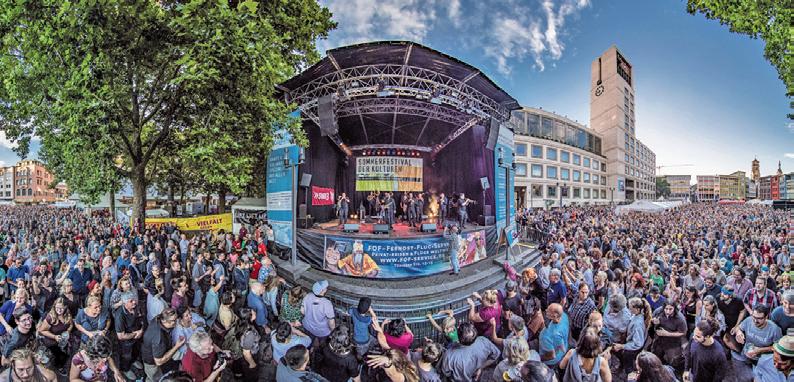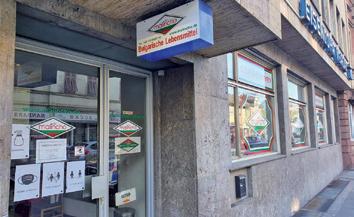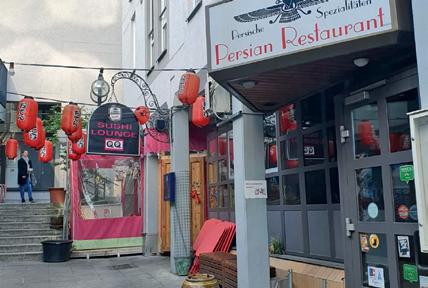
4 minute read
A “colorful” city: Cultural diversity in Stuttgart
By Bardia Khajenoori U.S. Army Garrison Stuttgart
It’s common knowledge that Stuttgart is one of the largest cities in Germany, but it sometimes escapes attention that it’s also one of its most diverse.
More than 40% of its residents have immigrated in the last fifty years or have at least one non-German parent, according to German census records. Only Frankfurt bests the Baden-Württemberg capital in diversity.
Approximately 170 nations are represented, according to Rolf Graser, executive director of the Forum der Kulturen Stuttgart e. V., an umbrella organization of over 100 migrant cultural associations and intercultural institutions from Stuttgart and the surrounding area.

The many celebrations in the city throughout a typical year reflect this, with events ranging from the “Africa Festival” and “Indian Film Festival” to the “Latin American Weekend.”
The centerpiece of the cultural festival circuit, and the largest intercultural festival in all of southern Germany, is the annual Sommerfestival der Kulturen, or Summer Festival of Cultures, organized by the Forum der Kulturen.

A Bulgarian grocery store in Stuttgart-Bad Cannstatt.
Photo by Bardia Khajenoori
The six-day event, which normally takes place on Stuttgart’s Marktplatz, draws thousands of visitors and offers live entertainment, shopping, and limitless food options with 70 clubs taking turns staffing 30 food stalls around the square. Kyla Sikorski and her family stumbled upon the festival three years ago as they were exploring the city.
“It was just a hoppin’ place, more packed than even the Christmas markets we had been to [at Marktplatz],” said Sikorski. “There were so many different booths of different cultures and ethnicities, and all kinds of food.”
They came away with food and drink from at least seven different countries and handwoven baskets from an African vendor.

“Everybody brings something new and different to the table,” added Sikorki’s husband, Tim.
And that’s exactly the point, according to Graser.
While there are many examples of Stuttgart’s diversity, from the languages heard on Koenigstrasse, to the restaurant scene and cultural offerings, an arguably more significant outcome from diversity is that people learn to see things from different points of view, he said.

A panoramic view of the Sommerfest der Kulturen
Photo by Michael Haussmann
“The best way to learn that is to be with people from other backgrounds, with people who have other perspectives, other ways of thinking, other life experiences, and other biographies. That all leads to being able to do things a little bit more differently,” said Graser.
Graser went on to note a distinction between an “international” scene (describing a city like Frankfurt, which draws immigrants or expatriates for shorter, typically job-related periods of only a couple years) and an “intercultural” one which has developed over time and is more the product of people settling down. Stuttgart is a great example of the latter, he said.

Colombian soccer fans crowd a biergarten in Stuttgart to watch a match of the 2018 World Cup
Photo by Bardia Khajenoori
“We’re talking mainly about people who have been living here for 50 or 60 years,” said Graser. While they may have “roots” in the countries of their parents or grandparents, “they are fully Stuttgarters.”
But how did Stuttgart’s diversity come to be?
Immigration from other nations began in earnest in the early 1800s with the founding of the Kingdom of Württemberg, and increased noticeably during the first wave of industrialization, said Edith Neumann, head of the collection at the Stuttgart city museum (StadtPalais).
Neumann said at first textile, chemical and book printers came to Stuttgart, but by the end of the century mechanical engineering became the dominant industry. After World War I that mechanical engineering base became a thriving automotive industry. Quickly the demand for labor outgrew the domestic supply.

Persian restaurant sits next to a sushi bar in downtown Stuttgart
Photo by Bardia Khajenoori
“To compensate for the shortage of labor, the Federal Republic of Germany [then West Germany] concluded so-called ‘recruitment agreements’ with various European countries starting in the 1950s,” said Neumann. “The first agreement was concluded with Italy, quickly followed by other countries.”
The postwar American presence in the area also made some notable contributions to the area’s culture. Young G.I. 's brought with them American fashion and music, and the U.S. government founded so-called "youth houses" (jugendhäusern) – places Neumann said that not only provided an opportunity for recreation, but a place that taught young Germans democratic norms.

Today, Turks are top of the list of citizens of foreign countries registered in Stuttgart, followed by Croats, Italians, and Greeks.
Diversity contributes to city life by shaping it in many ways, said Neumann, from the range of goods available in stores to the spectrum of music and events.
Overall, “the different ways of seeing and behaving in a culturally diverse society contribute a great deal to people’s open interaction and togetherness in everyday life,” she said.




